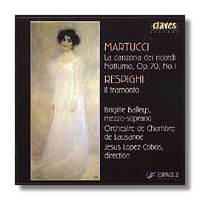
The Internet's Premier Classical Music Source
Related Links
- Latest Reviews
- More Reviews
-
By Composer
-
Collections
DVD & Blu-ray
Books
Concert Reviews
Articles/Interviews
Software
Audio
Search Amazon
Recommended Links
Site News
 CD Review
CD Review
Martucci & Respighi

Italian Orchestral Songs
- Giuseppe Martucci:
- La Canzone dei Ricordi *
- Notturno, Op. 70, #1 for Orchestra
- Ottorino Respighi:
- Il Tramonto *
* Brigitte Balleys, mezzo-soprano
Orchestre de Chambre de Lausanne/Jesús López-Cobos
Claves CD50-9807 50:42
Summary for the Busy Executive: Ravishing sounds.
The Martucci pieces attracted me to this disc, since I had never heard of Martucci, let alone his music. The Respighi, although hardly part of the classical Top Forty, nevertheless shows up from time to time. Martucci belonged to the generation eclipsed by Puccini. Like Respighi, he died relatively young, in his fifties. He made a fairly good career in his day as composer, conductor (he conducted the Italian première of Tristan), and academic. The only pieces I've heard by him are on this CD, so I can't generalize too confidently about his music. One does hear a combination of Puccini and Wagner – a smooth Italian lyricism with a touch of Wagnerian harmonic spice. The orchestra, handled more lightly than in Wagner's typical practice, nevertheless owes much to Wagner's view of the orchestra as an aural aurora borealis – constantly shimmering and shifting in color.
The Martucci works performed here are delicate and refined at their core. One feels a strong pull toward the bittersweet in the Notturno, as well as a radiant lyricism. The music may not have as strong a profile as Puccini's, but it's an authentic expression of personality nevertheless. One cannot divide the sentimentality from the rest of it, but if there's such a thing as tasteful sentimentality, then Martucci has it. This is even more evident in the song cycle La Canzone dei Ricordi ("song of remembrance"), a lovely work set to some ghastly fin de siècle poetry by one Rocco Pagliara, where the poems' persona recalls his lost love. The liner notes link this cycle to Müller's Schöne Müllerin, but even Müller writes better than this – fewer "flowers," at any rate. I wish I could say that Pagliara's words serve here mainly as pegs on which to hang notes or as a general backdrop against which one can emote. Clearly, however, Martucci takes a great deal of care with individual words and matching his orchestra to the meaning of the moment. This means merely that Martucci thought more of the poems than I do. The real question is whether the settings work. In large part, they work very well. Martucci's general song style derives, I think, from Wagner's Wesendonk Lieder, particularly in their Mottl orchestrations. The five songs all deal with lost love (the remembrance causing present anxiety) in several stock settings (by the river, in the woods, sailing the seas, at sunset, and so on), and this allows Martucci musically to do some nature painting, to reach an emotional crest, and to dissolve into regret. There's also a hint of symphonic construction in the cycle, where, mirroring Pagliara's text, the final song varies the first. Martucci takes the themes and accompanying figures of the first and abbreviates them or tries them in new modes, almost phrase by phrase. Even lacking the bold imagination of, say, Mahler or Strauss, the songs nevertheless deliver something genuine. For this, I believe, we have to thank as well Swiss mezzo Brigitte Balleys, López-Cobos, and the Lausanne. Balleys doesn't have the steadiest or strongest voice in the world, but she communicates with both taste and feeling, qualities echoed in López-Cobos.
It turns out that Respighi studied with Martucci, although the older composer, by his own testimony, didn't teach him much. For me, Respighi's work divides in two: the capable, but very conventional post-Romanticism of the Roman trilogy, and the bolder work based largely on Renaissance dances and Gregorian chant. Unfortunately, Il Tramonto (sunset), setting an Italian translation of a Shelley poem, falls into the first category. It is extremely well-made, expertly written for string orchestra (a version also exists for mezzo and string quartet), and Respighi subtly varies the accompaniment to sustain the interest of an essentially monochromatic ensemble. The poem, which I've never read outside of liner notes for this piece, concerns a maid whose lover died in her arms one night and who grows old longing for death and reunion. The string writing gets more interesting toward the end, especially during the apostrophe of the forlorn maiden. Respighi's setting is of a piece, an impressive feat – that is, he doesn't resort to cutting it up as a kind of dramatic scena or recitative. On the other hand, it's more mood than music. As far as the musical ideas go, there's very little that captures one's attention. Respighi wrote better than this. Much of the impact comes down to Balleys's singing, a bit like hearing a superior reader of poetry. She gives all kinds of shading to each line, without calling attention to her art. This is my first hearing of her, and I'd love to know how well she does Schubert or Fauré. López-Cobos and his ensemble match her refinement.
The recorded sound is both natural and lovely, very close to what you'd hear in a mid-size concert hall.
Copyright © 2001, Steve Schwartz


















